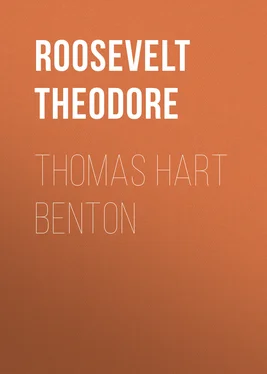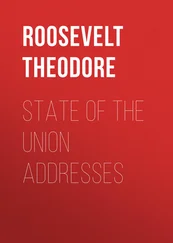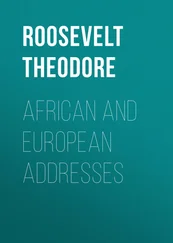Theodore Roosevelt - Thomas Hart Benton
Здесь есть возможность читать онлайн «Theodore Roosevelt - Thomas Hart Benton» — ознакомительный отрывок электронной книги совершенно бесплатно, а после прочтения отрывка купить полную версию. В некоторых случаях можно слушать аудио, скачать через торрент в формате fb2 и присутствует краткое содержание. Жанр: foreign_prose, История, foreign_edu, foreign_antique, на английском языке. Описание произведения, (предисловие) а так же отзывы посетителей доступны на портале библиотеки ЛибКат.
- Название:Thomas Hart Benton
- Автор:
- Жанр:
- Год:неизвестен
- ISBN:нет данных
- Рейтинг книги:4 / 5. Голосов: 1
-
Избранное:Добавить в избранное
- Отзывы:
-
Ваша оценка:
- 80
- 1
- 2
- 3
- 4
- 5
Thomas Hart Benton: краткое содержание, описание и аннотация
Предлагаем к чтению аннотацию, описание, краткое содержание или предисловие (зависит от того, что написал сам автор книги «Thomas Hart Benton»). Если вы не нашли необходимую информацию о книге — напишите в комментариях, мы постараемся отыскать её.
Thomas Hart Benton — читать онлайн ознакомительный отрывок
Ниже представлен текст книги, разбитый по страницам. Система сохранения места последней прочитанной страницы, позволяет с удобством читать онлайн бесплатно книгу «Thomas Hart Benton», без необходимости каждый раз заново искать на чём Вы остановились. Поставьте закладку, и сможете в любой момент перейти на страницу, на которой закончили чтение.
Интервал:
Закладка:
The Jacksonian Democracy stood for the revolt against these rulers; its leaders, as well as their followers, all came from the mass of the people. The majority of the voters supported Jackson because they felt he was one of themselves, and because they understood that his election would mean the complete overthrow of the classes in power and their retirement from the control of the government. There was nothing to be said against the rulers of the day; they had served the country and all its citizens well, and they were dismissed, not because the voters could truthfully allege any wrong-doing whatsoever against them, but solely because, in their purely private and personal feelings and habits of life, they were supposed to differ from the mass of the people. This was such an outrageously absurd feeling that the very men who were actuated by it, or who, like Benton, shaped and guided it, were ashamed to confess the true reason of their actions, and tried to cloak it behind an outcry, as vague and senseless as it was clamorous, against "aristocratic corruption" and other shadowy and spectral evils. Benton even talked loosely of "retrieving the country from the deplorable condition in which the enlightened classes had sunk it," although the country was perfectly prosperous and in its usual state of quiet, healthy growth. On the other hand, the opponents of Jackson indulged in talk almost as wild, and fears even more extravagant than his supporters' hopes; and the root of much of their opposition lay in a concealed but still existent caste antagonism to a man of Jackson's birth and bringing up. In fact, neither side, in spite of all their loud talk of American Republicanism, had yet mastered enough of its true spirit to be able to see that so long as public officers did their whole duty to all classes alike, it was not in the least the affair of their constituents whether they chose to spend their hours of social relaxation in their shirt-sleeves or in dress coats.
The change was a great one; it was not a change of the policy under which the government was managed, as in Jefferson's triumph, but of the men who controlled it. The two great democratic victories had little in common; almost as little as had the two great leaders under whose auspices they were respectively won,—and few men were ever more unlike than the scholarly, timid, and shifty doctrinaire, who supplanted the elder Adams, and the ignorant, headstrong, and straightforward soldier, who was victor over the younger. That the change was the deliberate choice of the great mass of the people, and that it was one for the worse, was then, and has been ever since, the opinion of most thinking men; certainly the public service then took its first and greatest step in that downward career of progressive debasement and deterioration which has only been checked in our own days. But those who would, off-hand, decry the democratic principle on this account would do well to look at the nearly contemporaneous career of the pet heroes of a trans-Atlantic aristocracy before passing judgment. A very charming English historian of our day 1 1 Justin McCarthy.
has compared Wellington with Washington; it would have been far juster to have compared him with Andrew Jackson. Both were men of strong, narrow minds and bitter prejudices, with few statesmanlike qualities, who, for brilliant military services, were raised to the highest civil positions in the gift of the state. The feeling among the aristocratic classes of Great Britain in favor of the Iron Duke was nearly as strong and quite as unreasonable as was the homage paid by their homelier kinsfolk across the Atlantic to Old Hickory. Wellington's military successes were far greater, for he had more chances; but no single feat of his surpassed the remarkable victory won against his ablest lieutenant and choicest troops by a much smaller number of backwoods riflemen under Andrew Jackson. As a statesman Wellington may have done less harm than Jackson, for he had less influence; but he has no such great mark to his credit as the old Tennessean's attitude toward the Nullifiers. If Jackson's election is a proof that the majority is not always right, Wellington's elevation may be taken as showing that the minority, or a fraction thereof, is in its turn quite as likely to be wrong.
This caste antagonism was the distinguishing feature in the election of 1828, and the partially sectional character of the contest was due to the different degree of development the caste spirit had reached in different portions of the Union. In New England wealth was quite evenly distributed, and education and intelligence were nearly universal; so there the antagonism was slight, the bulk of the New England vote being given, as usually before and since, in favor of the right candidate. In the Middle States, on the contrary, the antagonism was very strong. In the South it was of but little political account as between the whites themselves, they all being knit together by the barbarous bond of a common lordship of race; and here the feeling for Jackson was largely derived from the close kinship still felt for the West. In the West itself, where Jackson's great strength lay, the people were still too much on the same plane of thought as well as of material prosperity, and the wealthy and cultivated classes were of too limited extent to admit of much caste feeling against the latter; and, accordingly, instead of hostility to them, the Western caste spirit took the form of hostility to their far more numerous representatives who had hitherto formed the bulk of the political rulers of the East.
New England was not only the most advanced portion of the Union, as regards intelligence, culture, and general prosperity, but was also most disagreeably aware of the fact, and was possessed with a self-conscious virtue that was peculiarly irritating to the Westerners, who knew that they were looked down upon, and savagely resented it on every occasion; and, besides, New England was apt to meddle in affairs that more nearly concerned other localities. Several of Benton's speeches, at this time, show this irritation against the Northeast, and also incidentally bring out the solidarity of interest felt throughout the West. In a long and able speech, favoring the repeal of the iniquitous "salt tax," or high duty on imported salt (a great hobby of his, in which, after many efforts, he was finally successful), he brought out the latter point very strongly, besides complaining of the disproportionate lightness of the burden imposed upon the Northeast by the high tariff, of which he announced himself to be but a moderate adherent. In common with all other Western statesmen, he resented keenly the suspicion with which the Northeast was then only too apt to regard the West, quoting in one of his speeches with angry resentment a prevalent New England sneer at "the savages beyond the Alleghanies." At the time we are speaking of it must be remembered that many even of the most advanced Easterners were utterly incapable of appreciating the almost limitless capacity of their country for growth and expansion, being in this respect far behind their Western brethren; indeed, many regarded the acquisition of any new territory in the West with alarm and regret, as tending to make the Union of such unwieldy size that it would break of its own weight.
Benton was the leading opponent of a proposal, introduced by Senator Foot of Connecticut, to inquire into the expediency of limiting the sales of public lands to such lands as were then in the market. The limitation would have been most injurious to the entire West, which was thus menaced by the action of a New Englander, while Benton appeared as the champion of the whole section, North and South alike, in the speech wherein he strenuously and successfully opposed the adoption of the resolution, and at the same time bitterly attacked the quarter of the country from which it came, as having from the earliest years opposed everything that might advance the interests of the people beyond the Alleghanies. Webster came to the assistance of the mover of the measure in a speech wherein, among other things, he claimed for the North the merit of the passage of the Ordinance of 1787, in relation to the Northwest Territory, and especially of the anti-slavery clause therein contained. But Benton here caught him tripping, and in a very good speech showed that he was completely mistaken in his facts. The debate now, however, completely left the point at issue, taking a bitterly sectional turn, and giving rise to the famous controversy between Hayne, of South Carolina, who for the first time on the floor of the Senate announced the doctrine of nullification, and Webster, who, in response to his antagonist, voiced the feeling of the Union men of the North in that wonderful and magnificent speech known ever since under the name of the "Reply to Hayne," and the calling forth of which will henceforward be Hayne's sole title to fame. Benton, though himself a strong Union and anti-nullification man, was still too excited over the subject-matter of the bill and the original discussion over it to understand that the debate had ranged off upon matters of infinitely greater importance, and entirely failed to realize that he had listened to the greatest piece of oratory of the century. On the contrary, encouraged by his success earlier in the debate, he actually attempted a kind of reply to Webster, attacking him with invective and sarcasm as an alarmist, and taunting him with the memory of the Hartford Convention, which had been held by members of the Federalist party, to which Webster himself had once belonged. Benton afterwards became convinced that Webster's views were by no means those of a mere alarmist, and frankly stated that he had been wrong in his position; but at the time, heated by his original grievance, as a Western man, against New England, he failed entirely to understand the true drift of Hayne's speech. Much of New England's policy to the West was certainly excessively narrow-minded.
Читать дальшеИнтервал:
Закладка:
Похожие книги на «Thomas Hart Benton»
Представляем Вашему вниманию похожие книги на «Thomas Hart Benton» списком для выбора. Мы отобрали схожую по названию и смыслу литературу в надежде предоставить читателям больше вариантов отыскать новые, интересные, ещё непрочитанные произведения.
Обсуждение, отзывы о книге «Thomas Hart Benton» и просто собственные мнения читателей. Оставьте ваши комментарии, напишите, что Вы думаете о произведении, его смысле или главных героях. Укажите что конкретно понравилось, а что нет, и почему Вы так считаете.












